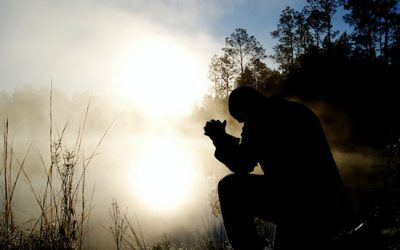Sabbath School is the Bible study component of the church program at most Seventh-day Adventist Churches. It’s a time of Bible study on a specific topic or lesson. Instead of listening to a preacher, people interact with one another, making it a great opportunity for building friendships.
Your Adventist friend or relative may have mentioned Sabbath School. Or perhaps you saw a sign for it outside a local Adventist Church.
Curious? Let’s walk through the experience together. By the end, you’ll have everything you need to know to try it out for yourself.
We’ll cover:
What is Sabbath School?
Sabbath School is like a small group Bible study that takes place on Sabbath mornings (Saturday) in addition to the main service at an Adventist Church. It’s the equivalent of Sunday school for other Christians, and it’s offered for all ages: from babies to elder adulthood.
Both church members and guests are welcome to take part, learn, and grow in their faith during this time.
So what does Sabbath School entail?
It has three main purposes:
Bible Study
Photo by Hannah Busing on Unsplash
The Adventist church’s motto for Sabbath School is “the church at study.” During this time we dig into the Bible, sharing insights and grappling with challenging topics. The focus is not on having all the answers, but turning to God and seeking the answers in His Word as the Holy Spirit guides us.
In this way, we grow in our faith journeys as we share with others and learn from them.
When you attend for the first time, you may want to just observe and listen, and that’s totally fine! But if you want to speak up, your questions and thoughts will enrich the Bible study time. Hearing the experiences and testimonies of others shows us how God is still working in people’s lives today.
Connection
The Bible says a lot about the importance of community. We need one another. And Sabbath School’s second purpose is to build that sense of community. It’s a great time to interact, get to know one another, and offer encouragement. Being open and honest is key.
Unlike the main church service time, Sabbath School lets all participants share what’s on their hearts. We don’t just sit and listen to one person speak.
Small groups make this possible. Depending on the church, attendance can be 5-10 people or 20-40 people. Churches in larger areas sometimes split classes to make sure they stay small enough for discussion.
The atmosphere in Sabbath School is much more relaxed so people feel comfortable expressing their thoughts.
Mission
Photo by RDNE Stock project
Churches often use the Sabbath School time to highlight local and global mission projects. In some classes, participants may even band together and reach out to their community.
For example, they might decide to visit people who are sick or volunteer at a soup kitchen on Sabbath afternoon. Or they might pool money together to sponsor a child. There are all kinds of possibilities.
In short, Sabbath School allows us to come together, dig into God’s Word, and serve our world and community. It follows the model of the early Christian church, which gathered in small groups for Bible study and fellowship:
“And they devoted themselves to the apostles’ teaching and the fellowship, to the breaking of bread and the prayers” (Acts 2:42; also verses Acts 2:46–47, ESV).
Jesus Himself taught His disciples in small groups (Matthew 24:3; Mark 9:28), and He promised this:
“For where two or three are gathered in My name, there am I among them” (Matthew 18:20, ESV).
What happens during Sabbath School?
Sabbath School usually begins in the mid-morning hours, anywhere from 9am to 11am depending on the church, and it runs for about an hour and 20 minutes. Most of this time is for Bible study. But at many churches, it starts with other activities, such as song service, a mission report, and prayer.
Let’s go through the full experience.
Sabbath School begins
Most churches begin Sabbath School with a preliminary program with everyone gathered together. But occasionally, the main worship service occurs first, if the pastor has multiple churches to preach at each Sabbath.
And in some larger churches, there are two different church services so they can accommodate all their members. Then there’s time for Sabbath School in between. That way no matter which church service you attend, Sabbath School can still be easily included in your morning schedule.
But for this example, we’re going to walk in the door at 9:30 a.m.—a common Sabbath School start time.
We’ll make our way to the sanctuary—the main auditorium of the church—where the preliminary program is taking place. People typically meet here first.
As we enter, we can already hear the sound of singing. A couple more songs are sung before the coordinator for the morning (known as the Sabbath School superintendent) stands up to welcome everyone and pray. This individual announces that a mission report will be shared next.
The mission report can happen in a couple different ways.
The Adventist Mission department produces a monthly “Mission Spotlight” video, which highlights the church’s mission work in a certain region of the world. The video is 5 to 10 minutes long.
On other Sabbaths, someone might read the assigned mission story for the week from the Youth and Adult Mission booklet.
Afterward, the superintendent makes some announcements, shares a Bible passage, or reads a spiritual thought before dismissing everyone to their classes.
Small group time
Photo by Israel Torres
The most important part of Sabbath School takes place when small groups gather to dig into God’s Word.
It’s close to 10 a.m. now, which means that the groups will have about 45 to 50 minutes together.
Some adult classes meet in the sanctuary area, while others have separate rooms. We make our way to a circle of chairs and sit down with a group of about 10 people.
Whoever is leading the Sabbath School class will greet everyone, maybe chit-chat a bit, and ask whether anyone has prayer requests. These few minutes of conversation help break the ice and connect the participants.
Then the teacher prays, asking for the Holy Spirit to lead, and we dive into the week’s lesson.
What do we study?
The class might study a certain topic or book of the Bible, or even read through the Bible together. But in many Adventist churches, the teacher will lead a discussion through the Sabbath School lesson study guide.
Let’s learn about that next.
What are the Sabbath School lesson study guides?
The Adventist Church produces the official Adult Bible Study Guide for use during Sabbath School. It is often referred to as “the lesson” or “the quarterly,” which comes from the word quarter because it’s intended for one-quarter of the year (3 months or 13 weeks). During that quarter, each week’s lesson digs into various aspects of a chosen topic or book of the Bible.
For example, one whole lesson quarterly might focus on the book of Matthew. Another might be on the topic of the Body of Christ, family relationships, the fruits of the Spirit, etc..
The Sabbath School lesson quarterly has one page for each day. The page provides Bible verses for the individual to look up and questions to answer along with some explanation.
Many classes go day by day through the previous week’s lesson and discuss what they learned.
But don’t worry—even if you weren’t able to study the lesson for the week, you’ll still be able to follow along and enjoy the discussion.
What should I bring to Sabbath School?
All you need to bring is yourself and a willingness to learn—really, it’s that simple. But some also like to bring their Bibles and a copy of the quarterly.
The Sabbath School lesson quarterly is usually handed out the Sabbath before the beginning of the new quarter. (Quarters begin in January, April, July, and October).
If you weren’t around to receive one, chances are that there are extras lying around on a table in the church’s entryway. And if not, you can access the Sabbath School lesson online or on a Sabbath School app on your smartphone.
Sabbath School offering
During the Bible study, the teacher may pause the lesson to pass around a couple of envelopes for the Sabbath School offering. An “offering” is a voluntary gift of money to help support various causes in the church. This offering is collected in all the classes, including the ones for children.
You may notice that there are two envelopes. One is for Sabbath School expenses, such as the purchase of Bible study guides.
The other envelope is for the mission offering and goes to support a region of the world church that has been selected for the quarter (the same region that the “Mission Spotlight” highlighted).
But no pressure—you are not required to give.
Giving an offering is up to you and what God places on your heart (Exodus 35:22); it is different from tithe (Malachi 3:10), which involves returning ten percent of our income to God.
What is the 13th Sabbath offering?
The 13th Sabbath offering is a term for a special collection of money on the last Sabbath of the quarter—the 13th Sabbath. On that day, churches worldwide support a specific mission project chosen by the Adventist Mission department of the General Conference.
Aside from the collection of the offering, the children’s classes may put on a special program during the preliminaries. They may present a song or skit that relates to the region of the world where the mission project is located.
Sabbath School is over for the morning
Often you’ll hear some sort of signal at the end of Sabbath School around 10:50 a.m. The main church service will soon begin.
Our teacher makes some closing remarks before wrapping up with prayer. We spend a few moments chatting with people as we gather our belongings and head to find a seat for the main service.
We’ve finished our adult Sabbath School experience, but you may be wondering about the classes for children.
Let’s look at the different options in a typical church.
What are the Sabbath School options for different age groups?
Most Adventist churches have Sabbath School classes for both adults and children. These classes are divided by age or stage of life to provide appropriate content and opportunity for fellowship. There are three main categories: children, youth/young adults, and adults.
But larger churches break these categories up even more.
Occasionally, there are more specific classes for adults: a class for women, a class for college students, or a class for people who are wanting to prepare for baptism.
The children’s classes are also further divided as follows:
- Cradle Roll or Beginners (birth–age 2)
- Kindergarten (ages 3–4)
- Primary (ages 5–9)
- Junior (ages 10–12)
- Earliteen (ages 13–14)
- Teen/Youth (ages 15–18)
So what happens in the children’s classes?
The Adventist Church provides Bible-based materials for each one. Teachers may choose to use these as the basic outline for their classes.
The Beginners class is the most interactive of all. Usually, the classroom will have decorations and props to match a theme, such as heaven or Creation. Throughout the program, the teacher reads short scripts, interspersed with songs and activities for the children to do.
The class will also have a storytime, using visual aids to catch the children’s attention. Traditionally, many Adventist children’s Sabbath School classes used felt boards—boards on which cloth cut-outs of characters and objects could be placed to tell a story.
The Kindergarten and Primary classes also use play and objects to interact with the children, though by this age, they can understand and participate much more. The teacher might give them pictures to color or crafts to make, too.
As the students become older, the classes shift from hands-on activities to conversing and engaging on a deeper level. The focus is applying the Bible’s principles and stories to the lives of the children and young people in each age group.
For each class—from the smallest children to teenagers—the Adventist Church has produced take-home materials that include age-appropriate Bible stories and character-building lessons.
How to find a Sabbath School near you
Now that you know more about Sabbath School, all that’s left for you to do is experience one in person! The Adventist Church’s website has a useful tool that allows you to find a church in your area. Once you find one, check its website or Facebook page for service times.
You can also bring Sabbath School to your home. Download the Sabbath School lesson at the Adult Bible Study Guide website. This way, you can follow along with what churches across the world are studying. You may even be able to catch the livestream of your local church’s services.
Many online programs follow the same study guide too, providing insight and discussion on the week’s lesson. Here are some of the most popular:
No matter where you are, you can enjoy the blessings of exploring God’s Word!
Sabbath School is for everyone
Sabbath School provides a setting for people of all ages to connect, study the Bible, and fulfill the mission of the worldwide church.
Photo by Erika Giraud on Unsplash
The Bible study guides help unify people across the globe as they delve into the same lesson.
And the structure of Sabbath School allows people to get to know Jesus and each other better as they come with their questions and thoughts. During this time, friendships can bloom and spiritual growth can happen.
Whether you’re a teen or a young mother or a retiree, there’s a place for you!
That’s what it’s all about:
Joining with others to dig into biblical truths that are relevant to our lives and the mission of sharing Jesus Christ.
Ready to check things out for yourself?
Find a Church
If you’re interested in finding a local Adventist church near you, you can use the Adventist Locator provided by the General Conference of Seventh-day Adventists.
More Answers
What Counts as “Work” on the Sabbath?
God designed the Sabbath day to be a 24-hour period when we could pause and enjoy the goodness of His creation. We do this by putting aside our regular work so we can focus on spending time with Him and appreciating what He’s created (Exodus 20:8-11).
Who Changed the Sabbath to Sunday?
If the Bible never mentions the change of the Sabbath, why do so many today attend church on Sunday?
What Is Children’s Sabbath School in the Adventist Church?
Children’s Sabbath School is a Bible program offered every Sabbath at Adventist churches for children from birth to age 18. These classes give children the chance to learn Bible stories, make new friends, and participate in fun activities.
What Day Is the Sabbath, and How Do We Know?
The Sabbath is a declaration of weekly rest by God which we find in the Bible (Genesis 2:2-3). But you may be wondering:
Sabbath Keeping: What It Looks Like in the Bible
That Sabbath would not be about a checklist of rules but about a mindset of rest. It’s a day to set aside daily cares and connect with God, our Creator. Out of our love for Him, we take the principles of the Bible and apply them in the way we keep the Sabbath.
13th Sabbath Offering: What It Is and Why It Matters
While the previous 12 Sabbaths of the quarter feature an established Adventist ministry and its current giving needs, the 13th is a rotating spot reserved for current mission projects.
Rest and Reconnection: What It Really Means to Keep the Sabbath
The Bible tells us that we keep the Sabbath by avoiding work. God made this law because he knew it would strengthen us and bring us joy, as well as give us time to reconnect with Him and recharge from our busy lives.
Everything You Need to Know About Sabbath Meals
For Seventh-day Adventists, sharing a Sabbath meal with friends and family is one of the most special and memorable parts of the Sabbath.
Why is the Sabbath Observed from Sunset to Sunset?
If you know of any Adventists, you may have noticed that they stop their work or business activities before sundown on Friday. What’s the reason behind this?
How Important is a Weekly Sabbath as a Day of Rest?
Around the world, different religious groups have had a Sabbath—a day set apart for rest each week. A day to worship together, spend time with loved ones, and to just rest.
Why do Adventists Worship on Saturday?
Adventists worship on the seventh day of the week because God made Saturday a holy day at creation. Learn what makes this day so special to Adventists.
Didn’t find your answer? Ask us!
We understand your concern of having questions but not knowing who to ask—we’ve felt it ourselves. When you’re ready to learn more about Adventists, send us a question! We know a thing or two about Adventists.










